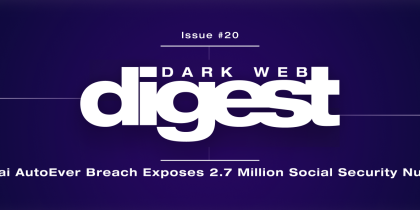Cyber threats don’t all look the same. Some target your devices with viruses and malware, while others stem from the shadows of the dark web, where stolen personal data is traded and exploited, often without the victim’s knowledge. This is where two very different types of tools come in: dark web monitoring and antivirus software.
While both are important for your digital security, dark web monitoring and antivirus work in completely different ways. In our guide to dark web monitoring vs regular antivirus, we’ll break down what each one does, the key differences between them, and why combining both can give you stronger, well-rounded online protection.
What is Dark Web Monitoring?
The dark web is a hidden part of the internet where stolen data, hacking tools, and illegal services are often bought and sold. If your personal information ends up there like an email address or credit card number, you may never know until it’s too late.
Your email could be compromised.
Scan it on the dark web for free – no signup required.
That’s where dark web monitoring comes in, which scans underground forums, marketplaces, and leaked databases for traces of your data. If a match is found, you’re alerted right away so you can take quick action like changing passwords or freezing accounts.
Instead of preventing a hack itself, dark web monitoring gives you an early warning that your sensitive details are exposed, so you have the opportunity to limit the damage before cybercriminals and other bad guys exploit them.
What is Antivirus?
Antivirus software protects you from malicious software like viruses, trojans, and ransomware. These threats can infect your computer or phone through downloads, email attachments, or unsafe websites, causing data loss, system crashes, or even theft of personal information.
An antivirus program works by scanning files and programs on your device, detecting suspicious activity, and blocking harmful software before it can do damage. Most also include real-time protection, firewalls, and safe browsing features to keep you secure while online.
Unlike dark web monitoring, which alerts you to stolen data after it’s exposed, antivirus acts as your first line of defense against malicious threats by stopping them from ever compromising your device in the first place.
Key Differences Between Dark Web Monitoring vs Antivirus
While both are important for your digital security, they protect you in very different ways. Dark web monitoring focuses on identity risks outside your device, while antivirus defends against malware directly on your system. Here’s a side-by-side look:
| Dark Web Monitoring | Antivirus | |
| Focus | Alerts you if your personal data appears on the dark web | Protects your device from malware and malicious files |
| Scope | Monitors forums, dumps, and marketplaces for exposed credentials | Scans downloads, apps, and websites for threats |
| Timing | Detects leaks after a breach occurs | Blocks threats in real time before damage is done |
| Action | Notifies you so you can change passwords, freeze accounts, or act quickly | Quarantines, deletes, or blocks harmful files automatically |
| Outcome | Helps minimize identity theft and fraud risks | Keeps your devices safe, stable, and malware-free |
| Cost | Often bundled with premium security plans | Usually requires a separate subscription (some free versions exist) |
Who Should Use Dark Web Monitoring vs Antivirus?
Choosing between dark web monitoring and antivirus depends on how you use the internet and what you’re trying to protect.
Dark Web Monitoring is best for:
- People who shop or bank online frequently and have sensitive info like credit cards or personal IDs stored on multiple platforms.
- Professionals and freelancers who share personal data with clients or use online services to manage accounts.
- Families and parents who want to protect their children’s email addresses, IDs, or social logins from being leaked.
- Small business owners who want early alerts if company emails or credentials are found in stolen databases.
On the other hand, antivirus is best for:
- Everyday users who browse the web, open email attachments, or download apps and files.
- Remote workers or students who log in to multiple tools and platforms daily, increasing their exposure to malware.
- Anyone who shares devices with family members or coworkers, making them more vulnerable to accidental downloads or phishing.
- Gamers or content creators who install third-party software or mods that could carry hidden malware.
Dark Web Monitoring vs Regular Antivirus: Do You Need Both?
Dark web monitoring and antivirus aren’t competing tools as they cover different parts of your digital life. Antivirus keeps your devices safe from malware, ransomware, and other active threats, while dark web monitoring alerts you if your personal information is already exposed and circulating in stolen databases.
While some users might lean toward one depending on their priorities, using both together creates a stronger safety net. Antivirus protects you on the front lines, blocking malicious files before they can cause damage, while dark web monitoring works in the background, alerting you to risks that antivirus simply can’t detect.
Combined, they give you well-rounded protection that addresses both device security and identity security, reducing the chances of malware infections while also keeping you informed if your data is ever exposed. That way, you’re protected on both fronts: your devices stay safe, and your personal data doesn’t slip under the radar.
- Related Read: Dark Web Monitoring vs Identity Theft Protection.
Frequently Asked Questions
Dark web monitoring looks for your personal data in stolen databases and alerts you if it appears, while antivirus protects your device from malware, ransomware, and other active threats. One focuses on identity protection, the other on device security.
No. Dark web monitoring can’t block malware or remove viruses from your device, and antivirus can’t scan the dark web for stolen data. They handle different risks and are most effective when used together.
Yes. Antivirus only protects your devices, while dark web monitoring alerts you to leaks outside of them. If your data is stolen in a breach, antivirus won’t catch it—but dark web monitoring will.
For complete protection, yes. Antivirus stops active threats from infecting your devices, and dark web monitoring warns you if your credentials are already compromised. Together, they reduce the chance of both malware infections and identity theft.
Final Word
Cybersecurity isn’t one-dimensional. Protecting your laptop from malware doesn’t stop cybercriminals from trading your stolen passwords, just as spotting a data leak won’t remove a virus from your phone.
Dark web monitoring and antivirus solve different problems, and that’s exactly why they work best together. When you use both, you cover the blind spots each one leaves behind, keeping your devices stable and your identity safer.








